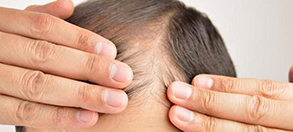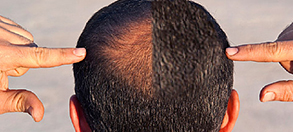
Hair loss in women is a common occurrence resulting from stress, aging, pregnancy, or lifestyle changes. When we hear about hair loss in advertisements, it is often about men losing their hair. Creams, shampoos, and supplements are geared toward male pattern baldness, but many do not realize how common thinning hair is for women, with over 50% being affected. Women, like men, are often embarrassed by hair loss and are quick to search for reasons why their hair is falling out. They may change their diets, ask their doctor to run blood work or buy special shampoos to try to reverse it. When all else fails, they may start looking towards wigs or extensions, which can harm the existing hair and scalp health. While female pattern baldness is often seen as a product of aging or genetics, sometimes female baldness is a symptom of a more significant issue at bay.
At Houston Hair Transplant Center (HHTC), we are proud to be the hair transplant surgeons of choice for athletes, actors, and celebrities. We can help you address hair loss and grow thicker, longer hair with personalized hair loss treatments specifically designed for women. Dr. Goran Jezic is well known for his customizable, innovative treatments to improve hair growth for a natural, more youthful appearance. He has helped thousands of patients reverse their hair loss and achieve thicker, fuller hair growth with lasting results.
Contact our office or call (713) 864-2300 to learn more.
Contents
About Hair Loss in Women

Many women may not notice excessive hair loss at first, but it can be devastating when they do. When hair loss begins for women, they may think they are shedding a bit more than usual — perhaps they notice more hair loss while in the shower or brushing their hair. There is not necessarily cause for alarm at first because losing between 50 and 100 strands of hair per day is normal. It is natural for hair to fall out when you wash, brush, and style it. (1)
Hair loss treatments for women are personalized by our expert clinicians, providing comprehensive solutions to your hair loss designed to replenish your hair and restore your confidence in your appearance. Due to the overwhelming number of hair loss ads for men and perhaps the stigma associated with hair loss in women, many people may not realize that androgenic alopecia (also called female pattern hair loss) is a prevalent issue among women of all ages. While the cause is identical to androgenic alopecia in men (male pattern), it presents uniquely, typically forming a pattern that resembles a pine tree (think Christmas), followed by thinning through the temporal troughs, occipital (back of the head) region, and temples. It’s often more severe in women and it’s significantly more difficult to treat. (2) Dr. Jezic and his associates can create a customized treatment plan depending on the cause of your hair loss to help you promote new, thick growth and dramatically reduce or halt your loss.
Genetic Hair Loss
Thinning hair that occurs with age is often caused by androgenic alopecia. The common condition affects approximately 50% of women (3) and can impact self-confidence. This is one of the most common causes of hair loss; however, it can happen so gradually that you may not notice it at first. Excessive hair shedding becomes most noticeable when the scalp becomes more visible.
While men tend to experience hair loss beginning at the forehead and crown of the head, women are more likely to experience thinning hair at the top of the head — usually along the top third or half of the scalp. The good news is that there are many ways to treat hair loss. During your consultation, Dr. Jezic can assess your scalp to determine the best treatment and find a solution for your specific condition.
Thyroid Conditions

The thyroid impacts our heart rates and metabolism. If you experience a thyroid imbalance, it is expected also to experience thinning hair. A slow thyroid (hypothyroidism) and a fast thyroid (hyperthyroidism) can cause hair loss and changes in texture. While hyper- and hypothyroid are perhaps the most well-known thyroid conditions, they are not the only disorders that affect this gland. Hashimoto’s thyroiditis is a common autoimmune disorder in which the body attacks the thyroid and is most commonly found in middle-aged women.
Treatment for any thyroid disorder typically includes medication. After you receive a diagnosis, we can develop an effective treatment plan to help your hair return to normal.
Polycystic Ovary Syndrome (PCOS)
PCOS is a common hormonal disorder that causes an excess of androgen levels (male sex hormones). It usually affects women during their reproductive years and can cause several symptoms that affect their quality of life:
- Increased facial and body hair
- Hair loss on the scalp
- Both hair loss and increased hair in unwanted areas
When PCOS causes hair loss in women, it is classified as male pattern baldness because androgen levels result in thin hair. As a result, the treatment for this type of hair loss is the same as pattern baldness. Dr. Jezic can prescribe oral finasteride and topical minoxidil. He can also perform a hair transplant to help you grow even thicker hair.
Lupus
Lupus is a complex but relatively common autoimmune disorder affecting many body areas, including joints, skin, and major internal organs and vessels. While both women and men can have lupus, it is more commonly found in women. Lupus is difficult to diagnose because it can imitate other diseases. Although there is no cure for lupus, and the cause is unknown, patients can usually manage it with medication. After it is under control, most patients experience improved hair growth. If you have been diagnosed with lupus, it’s best to seek treatment from a specialist in the field.
Iron-Deficient Anemia
A common side effect of iron-deficient anemia is hair loss. Like many other diseases on this list, this type of anemia is most often found in women. A simple blood test can determine if you are anemic. Luckily, the treatment is relatively straightforward: taking an iron supplement can prevent further damage and help promote healthy hair growth. In severe cases, more aggressive therapies may be required.
Severe Stress or Anxiety Disorders
When people experience chronic stress, it can manifest itself in physical ways. We commonly hear about weight gain or loss, but thinning hair is another symptom. Sometimes, it is so gradual that the person may not notice it until they have substantial hair loss or the hair begins to grow back, resulting in patches of concise hair next to longer hair or a thinning hairline. Treatment for chronic stress and anxiety typically involves cognitive behavioral therapy, lifestyle changes, and sometimes medication. In this case, hair regrowth is often possible through treatment, although eliminating stressors is often sufficient in reducing loss, and hair will typically regrow after. Some patients experience temporary hair loss from temporary stressors. In these cases, their hair grows back when the stressor is eliminated. If you think you may be suffering from any of these diseases, your doctor can run a blood panel and refer you to a specialist if necessary.
Medication
A whole host of medications have hair loss listed as a side effect. Some of the medicines commonly linked to hair loss include:
- Retinoids
- Antidepressants
- Statins
- Birth control pills
- Immunosuppressants
- Beta-blockers
- Steroids
- Thyroid medications
If you experience hair loss from taking any of these medications, adjusting them can help you control your hair loss. You can also talk to your doctor about taking a different generic form of your medication. Each medication will have a slightly different formula; one drug may work better for you.
Dr. Jezic can discuss your current medications and discuss any questions you have about hair loss. He can also discuss alternatives to explore with your physician if you are interested in adjusting your medications or believe your hair loss is linked to a medication change.
Alopecia Areata
Alopecia areata is an autoimmune disorder that causes your body to attack healthy hair follicles. As a result, the hair follicles fall out, and some patients experience hair loss in clumps. (4) Every case of alopecia areata is different, but many individuals lose chunks of hair randomly on the scalp. In rare cases, individuals lose all their head and body hair. Although this disease is not cured, your hair can grow back with the proper treatment. Common, effective treatments include:
- Corticosteroids
- Immunotherapy (for hair loss related to allergies)
- Topical minoxidil (Rogaine)
Benefits of Treatments for Hair Loss in Women
Hair loss treatments provide several benefits, including:
- Enhanced self-esteem: Regrowing your hair can restore your confidence in your appearance.
- Natural-looking results: Whether you receive hair transplants or medication, you can enjoy natural-looking results.
- Long-lasting results: Procedures such as hair transplants deliver lasting results if you take good care of your body.
- Quick recovery times: Hair restoration treatments require a short recovery period, so you can quickly return to your regular routine.
- Customizable plans: Dr. Jezic can adjust your hair loss treatment to fit your aesthetic goals and specific needs.
- Improved hair thickness: Treatments can increase hair volume, reverse signs of thinning, and provide a natural appearance.
Candidates
Ideal candidates for hair loss treatments are experiencing any form of hair thinning or loss. This could be due to excessive hair shedding (telogen effluvium), illness, stress, or childbirth. Candidates will need to have realistic expectations and be in good overall health.
It is important to understand the underlying causes of your hair loss. After obtaining this information, Dr. Jezic will discuss your treatment options in depth. Depending on the severity of your hair loss and medical history, trying oral medications like finasteride or topical minoxidil may be an effective treatment option.
Dr. Jezic can also perform hair transplant services. Women suffering from hormonal imbalances, those with telogen effluvium after stressful periods, or those displaying early signs of androgenetic alopecia should consider scheduling a consultation to discuss the best options.
Personal Consultation
We will examine your scalp during your consultation and ask about your lifestyle. If you are taking medications or have recently experienced a stressful period, we can discuss a treatment plan and lifestyle changes to support your hair growth. We can also discuss any additional aesthetic goals you have. Please come prepared with any questions you have. We will create a personalized procedure to help stimulate new, consistent hair growth.
Follicular Unit Extraction for Hair Loss in Women
Follicular unit extraction (FUE) is a treatment that extracts hair follicles from one area and places them in another to allow for improved density and natural-looking hair growth. During the procedure, Dr. Jezic will take hair follicles from portions of your scalp that are less affected by hair loss. He can take up to 20% of those donor follicles before they become noticeably thinner. He will then move the follicles to areas of the scalp where you would like thicker hair growth.
Depending on the severity of your hair loss, Dr. Jezic can also perform autologous conditioned plasma (ACP) treatments. During an ACP treatment, he will draw a blood sample from you and process it in a centrifuge to extract plasma. He can apply the plasma to your scalp with a thin needle to support the new growth.
The results from FUE are long-lasting if you take good care of your scalp, and the follicles will allow new strands of hair to grow as if they had never been disturbed. No new hair will grow in the donor site, but Dr. Jezic will carefully harvest your follicles so their absence should not be noticeable.
If FUE is something you are interested in to treat your thinning hair, contact us today for a consultation. We would love to help you become a more confident version of yourself!
Results of Hair Loss Treatments for Women
After a treatment for hair loss, you can enjoy thicker, more consistent hair growth. You can maintain your results if you take good care of your body and make lifestyle changes to avoid hair loss triggers. If you have a highly stressful routine, making changes to allow yourself to destress can also support your hair growth. You can enjoy more flexibility with hairstyles and a more youthful-looking appearance, which may increase your confidence.
The Cost of Treatments for Hair Loss in Women in Austin
The cost of treatments for hair loss in women will depend on your personalized plan. After a consultation, we can provide an all-inclusive quote to help you achieve your goals.
Contact our office or call (713) 864-2300 to learn how we can transform your appearance with customizable treatments today.
FAQ
Can I perform treatments for female hair loss on my own?
Over-the-counter products like minoxidil for women can be helpful. Still, a thorough evaluation by a professional is essential for achieving the best outcome and identifying underlying causes for lasting results.
Are hair transplants for women’s hair loss safe?
Yes, hair transplant surgeries are well-tolerated and have helped thousands of women achieve stunning results.
Will I have scars after treating female pattern baldness?
FUE does result in some scarring at the donor sights, but these scars are tiny and non-linear. They are often well hidden beneath the surrounding hair.
How long does it take to see results after treatments for hair loss in women?
Patients may begin noticing regrowth within a few months after treatment. During your consultation, we can answer any questions you have about the timeline.
References
- Bhat YJ, Saqib NU -, Latif I, Hassan I. Female Pattern Hair Loss—An Update. Indian Dermatology Online Journal. 2020;11(4):493-501. doi:https://doi.org/10.4103/idoj.IDOJ_334_19
- Bhat YJ, Saqib NU -, Latif I, Hassan I. Female Pattern Hair Loss—An Update. Indian Dermatology Online Journal. 2020;11(4):493-501. doi:https://doi.org/10.4103/idoj.IDOJ_334_19
- Gokce N, Basgoz N, Kenanoglu S, et al. An overview of the genetic aspects of hair loss and its connection with nutrition. Journal of preventive medicine and hygiene. 2022;63(2 Suppl 3):E228-E238. doi:https://doi.org/10.15167/2421-4248/jpmh2022.63.2S3.2765
- McElwee KJ, Gilhar A, Tobin DJ, et al. What causes alopecia areata? Experimental dermatology. 2013;22(9):609-626. doi:https://doi.org/10.1111/exd.12209



